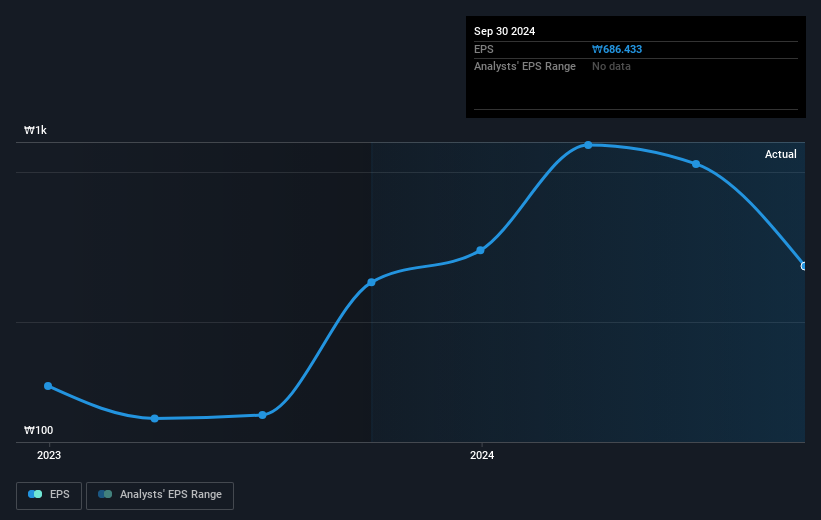- South Korea
- /
- Communications
- /
- KOSDAQ:A211270
Asia Pacific Satellite (KOSDAQ:211270) shareholders YoY returns are lagging the company's 32% five-year earnings growth

Asia Pacific Satellite Inc. (KOSDAQ:211270) shareholders might be concerned after seeing the share price drop 10% in the last week. On the bright side the returns have been quite good over the last half decade. Its return of 82% has certainly bested the market return!
While this past week has detracted from the company's five-year return, let's look at the recent trends of the underlying business and see if the gains have been in alignment.
See our latest analysis for Asia Pacific Satellite
In his essay The Superinvestors of Graham-and-Doddsville Warren Buffett described how share prices do not always rationally reflect the value of a business. One way to examine how market sentiment has changed over time is to look at the interaction between a company's share price and its earnings per share (EPS).
During the last half decade, Asia Pacific Satellite became profitable. That would generally be considered a positive, so we'd hope to see the share price to rise.
The company's earnings per share (over time) is depicted in the image below (click to see the exact numbers).

We know that Asia Pacific Satellite has improved its bottom line over the last three years, but what does the future have in store? If you are thinking of buying or selling Asia Pacific Satellite stock, you should check out this FREE detailed report on its balance sheet.
What About Dividends?
When looking at investment returns, it is important to consider the difference between total shareholder return (TSR) and share price return. The TSR is a return calculation that accounts for the value of cash dividends (assuming that any dividend received was reinvested) and the calculated value of any discounted capital raisings and spin-offs. It's fair to say that the TSR gives a more complete picture for stocks that pay a dividend. As it happens, Asia Pacific Satellite's TSR for the last 5 years was 88%, which exceeds the share price return mentioned earlier. The dividends paid by the company have thusly boosted the total shareholder return.
A Different Perspective
While the broader market lost about 3.9% in the twelve months, Asia Pacific Satellite shareholders did even worse, losing 9.5% (even including dividends). Having said that, it's inevitable that some stocks will be oversold in a falling market. The key is to keep your eyes on the fundamental developments. On the bright side, long term shareholders have made money, with a gain of 14% per year over half a decade. If the fundamental data continues to indicate long term sustainable growth, the current sell-off could be an opportunity worth considering. It's always interesting to track share price performance over the longer term. But to understand Asia Pacific Satellite better, we need to consider many other factors. To that end, you should learn about the 2 warning signs we've spotted with Asia Pacific Satellite (including 1 which is significant) .
If you are like me, then you will not want to miss this free list of undervalued small caps that insiders are buying.
Please note, the market returns quoted in this article reflect the market weighted average returns of stocks that currently trade on South Korean exchanges.
New: Manage All Your Stock Portfolios in One Place
We've created the ultimate portfolio companion for stock investors, and it's free.
• Connect an unlimited number of Portfolios and see your total in one currency
• Be alerted to new Warning Signs or Risks via email or mobile
• Track the Fair Value of your stocks
Have feedback on this article? Concerned about the content? Get in touch with us directly. Alternatively, email editorial-team (at) simplywallst.com.
This article by Simply Wall St is general in nature. We provide commentary based on historical data and analyst forecasts only using an unbiased methodology and our articles are not intended to be financial advice. It does not constitute a recommendation to buy or sell any stock, and does not take account of your objectives, or your financial situation. We aim to bring you long-term focused analysis driven by fundamental data. Note that our analysis may not factor in the latest price-sensitive company announcements or qualitative material. Simply Wall St has no position in any stocks mentioned.
About KOSDAQ:A211270
Asia Pacific Satellite
Develops and manufactures satellite communication devices worldwide.
Flawless balance sheet and slightly overvalued.
Market Insights
Community Narratives





